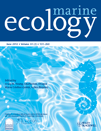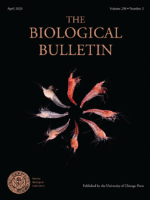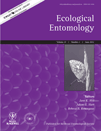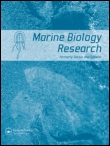
Marine Ecology-An Evolutionary Perspective
Scope & Guideline
Transforming Marine Ecology Through Evolutionary Perspectives
Introduction
Aims and Scopes
- Biodiversity and Conservation:
The journal highlights studies on marine biodiversity, documenting species richness and distribution, and addressing conservation strategies to protect vulnerable marine ecosystems. - Ecological Dynamics:
Research often focuses on the interactions among marine organisms, including trophic relationships, community structures, and the impact of environmental changes on these dynamics. - Evolutionary Adaptations:
Papers explore the evolutionary aspects of marine organisms, including genetic diversity, adaptations to environmental pressures, and the evolutionary history of various species. - Impact of Anthropogenic Factors:
The journal covers the effects of human activities, such as pollution and climate change, on marine ecosystems, assessing how these factors influence marine life and habitats. - Methodological Innovations:
Research often employs advanced methodologies, including molecular techniques, ecological modeling, and field experiments, to investigate marine ecological questions.
Trending and Emerging
- Climate Change Effects:
An increasing number of studies are examining the impacts of climate change on marine ecosystems, focusing on temperature fluctuations, ocean acidification, and their implications for marine species. - Microplastic Pollution:
Research on the effects of microplastics on marine life is gaining momentum, addressing their prevalence and potential impacts on food webs and marine biodiversity. - Genetic Connectivity and Evolution:
There is a trend towards exploring genetic connectivity among populations, emphasizing the importance of understanding evolutionary processes in the context of changing environmental conditions. - Ecosystem Services and Restoration:
Emerging studies focus on the role of marine ecosystems in providing services to humans, alongside restoration efforts to rehabilitate damaged marine environments. - Technological Integration:
The use of advanced technologies, such as remote sensing and genomic tools, is increasingly common in marine research, enhancing data collection and analysis capabilities.
Declining or Waning
- Traditional Taxonomy:
While taxonomy remains important, there is a noticeable decline in studies focused solely on traditional taxonomic descriptions, as newer methodologies like molecular techniques gain traction. - Single Species Studies:
Research concentrating on individual species without considering ecological interactions is becoming less common, as there is a growing emphasis on community ecology and ecosystem-level studies. - Historical Data Analysis:
There seems to be a waning interest in papers that rely heavily on historical data without integrating contemporary ecological assessments or experimental approaches.
Similar Journals

BIOLOGICAL BULLETIN
Connecting scholars with cutting-edge biological insights.BIOLOGICAL BULLETIN is a premier journal published by The University of Chicago Press, catering to the vibrant field of Agricultural and Biological Sciences. Established in 1945, this long-standing publication has evolved to serve as a critical platform for disseminating cutting-edge research and insights across various biological disciplines. With a commendable impact factor and ranking in the top quartile (Q1) of its category, the journal is recognized for its rigorous peer-review process and its commitment to high-quality scholarship, ranking #74 out of 221 in the Agricultural and Biological Sciences category on Scopus. Researchers, professionals, and students will find a valuable resource in BIOLOGICAL BULLETIN, as it continually fosters scientific dialogue and innovation, ensuring the advancement of knowledge in the biological sciences. Although not openly accessible, the journal provides numerous access options for institutions and individuals wishing to engage with its content.

ECOLOGICAL ENTOMOLOGY
Bridging Ecology and Entomology for a Sustainable FutureECOLOGICAL ENTOMOLOGY is a leading peer-reviewed journal published by Wiley, focusing on the dynamic interplay between insects and their environments. With an ISSN of 0307-6946 and an E-ISSN of 1365-2311, this journal has been a pivotal resource in the fields of ecology and insect science since its inception in 1976, and is set to continue until 2024. Recognized for its high academic standards, the journal maintains a prestigious Q1 ranking in both the Ecology and Insect Science categories for 2023, and ranks in the 84th percentile among its peers in agricultural and biological sciences. Although not an Open Access journal, it provides vital insights into ecological processes and insect interactions, making it an essential read for researchers, professionals, and students committed to understanding and conserving biodiversity. The contributions published within its pages significantly advance the knowledge of ecological systems and inform practical approaches to environmental management.

ECOLOGY LETTERS
Unveiling the intricacies of nature through rigorous research.ECOLOGY LETTERS, published by Wiley, is a premier journal dedicated to advancing the field of ecology and related disciplines. Renowned for its rigorous peer-review process and impactful research contributions, the journal boasts an impressive Scopus Rank of #13 out of 721 in the category of Agricultural and Biological Sciences, positioning it in the 98th percentile globally. With a Q1 rating in the 2023 quartile rankings for Ecology, Evolution, Behavior and Systematics, it serves as an essential platform for ecologists and evolutionary biologists to disseminate cutting-edge research findings from 1998 to 2024. Although not an open-access journal, ECOLOGY LETTERS actively contributes to the global ecology discourse, making it a critical resource for researchers, professionals, and students dedicated to understanding complex ecological interactions and evolutionary processes.

Marine Biodiversity
Fostering Insights into Marine ConservationMarine Biodiversity, published by SPRINGER HEIDELBERG, stands as a pivotal journal in the fields of Aquatic Science, Ecology, Evolution, Behavior and Systematics, and Oceanography. Established in 2009, it has gained a prominent place in academic discourse, evidenced by its Q2 ranking across multiple categories in the latest 2023 assessments. The journal operates out of Germany, specifically from its Heidelberg address, and caters to an international audience with a keen interest in the vast and complex dynamics of marine ecosystems. With an ongoing convergence of research outputs until 2024, Marine Biodiversity encourages contributions that expand our comprehension of marine life and its conservation, positioning itself as a vital resource for researchers, professionals, and students alike. Although currently not an open access journal, it maintains a robust reputation backed by its favorable Scopus ranks, which indicate its significant contribution to the respective fields. By disseminating high-quality, peer-reviewed articles, Marine Biodiversity plays an essential role in promoting scholarly communication and advancement in marine science.

Frontiers in Ecology and Evolution
Exploring the intricate dance of ecosystems and evolution.Frontiers in Ecology and Evolution, published by FRONTIERS MEDIA SA, stands as a premier open-access journal dedicated to the exploration and discourse in the interdisciplinary fields of ecology and evolutionary biology. With its inception in 2013, this journal has rapidly ascended to a prestigious position, securing a Q1 ranking in both Ecology and Ecology, Evolution, Behavior and Systematics categories, reflecting its influential impact in the respective fields. Operative from Switzerland, Frontiers in Ecology and Evolution enables researchers, professionals, and students to access high-quality research without barriers, promoting collaboration and innovation. The journal covers a broad range of topics, from ecological dynamics to evolutionary strategies, facilitating profound insights that drive scientific advancement and understanding. With a remarkable position in Scopus rankings—ranking #218 in Ecology, Evolution, Behavior and Systematics and #145 in Environmental Science—this journal is essential for anyone keen on contributing to or staying updated with contemporary research in ecology and evolution.

BIOLOGY BULLETIN
Illuminating Pathways in Agricultural Science and Research.BIOLOGY BULLETIN is a prominent academic journal published by PLEIADES PUBLISHING INC, dedicated to advancing the fields of Agricultural and Biological Sciences as well as Biochemistry, Genetics, and Molecular Biology. With an ISSN of 1062-3590 and E-ISSN of 1608-3059, the journal has been a vital resource for researchers and professionals since its commencement in 1996. Located in the United States, BIOLOGY BULLETIN operates within a highly competitive academic landscape, achieving a 2023 ranking in the Q3 quartile for Agricultural and Biological Sciences and Q4 for Biochemistry, Genetics, and Molecular Biology, highlighting its commitment to delivering impactful research despite its challenges. Researchers seeking to publish their findings will find a platform for significant insights, as reflected in its Scopus rankings, where it stands at #183 and #199 out of 221 in its respective categories, showcasing opportunities for growth and visibility. While currently not an open-access publication, BIOLOGY BULLETIN plays a crucial role in facilitating scholarly communication and fostering an understanding of biological sciences, making it an essential read for academics, professionals, and students alike.

RECORDS OF THE AUSTRALIAN MUSEUM
Pioneering Research in Ecology and EvolutionRecords of the Australian Museum is a leading journal in the fields of Animal Science, Ecology, History, and Museology, published by the renowned Australian Museum in Sydney, Australia. With a commitment to advancing knowledge and understanding of natural history and cultural heritage, this journal provides an essential platform for original research, reviews, and significant findings relevant to its diverse academic audience. The journal encompasses a broad scope, including studies in ecology, evolution, behavior, systematics, and the history of science, attracting contributions from leading scholars and professionals. Notably, it ranks highly in various categories, achieving a Q1 ranking in History and Museology, reflecting its impact and prestige within the academic community. Although it operates under a traditional access model, the journal ensures that its robust compilation of cutting-edge research remains vital to researchers, professionals, and students aiming to stay informed of the latest developments in their fields. With converging years of publication since 1983, Records of the Australian Museum continues to play a pivotal role in disseminating critical insights and fostering discussions that shape our understanding of both the natural world and our cultural heritage.

BULLETIN OF MARINE SCIENCE
Pioneering insights in marine and atmospheric studies.BULLETIN OF MARINE SCIENCE, published by Rosenstiel School of Marine and Atmospheric Science, is a prominent journal dedicated to advancing the field of marine science through scholarly research and peer-reviewed articles. With an ISSN of 0007-4977 and an E-ISSN of 1553-6955, this journal has been contributing to significant scientific discourse since its inception in 1973. Covering a wide spectrum of topics in aquatic sciences and oceanography, it has maintained a respectable position in the academic community, as evidenced by its Q3 ranking in both categories for 2023. Although currently not an open-access journal, it provides essential access to groundbreaking research that informs marine conservation, ecological studies, and atmospheric sciences. Situated in the United States at 4600 Rickenbacker Causeway, Miami, FL 33149, the journal serves as a vital resource for researchers, professionals, and students seeking to engage with the latest findings in marine science and foster a deeper understanding of our oceans.

Marine Biology Research
Illuminating the wonders of marine life.Marine Biology Research is a premier journal published by Taylor & Francis, focusing on the dynamic field of marine biology and its intersecting realms of aquatic science, ecology, and oceanography. Since its inception in 2005, this journal has served as a crucial platform for researchers and professionals to disseminate their findings, with a vision extending to 2024 and beyond. The journal is recognized with a Q3 quartile ranking in both Aquatic Science and Ecology, Evolution, Behavior and Systematics, underscoring its growing influence in these fields as evidenced by its Scopus rankings. Located in the United Kingdom, Marine Biology Research aims to foster collaboration and innovation through open access options, facilitating knowledge exchange among the academic community. With a steady commitment to advancing marine sciences, this journal is an invaluable resource for those dedicated to understanding and preserving our ocean ecosystems.

Journal of Insect Biodiversity
Illuminating the Path of Insect Biodiversity ResearchJournal of Insect Biodiversity, published by MAGNOLIA PRESS in New Zealand, offers a vital platform for researchers and professionals interested in the intricate world of insect science. Established in 2019, this journal covers a wide array of topics within its field, focusing on the ecological, evolutionary, and behavioral aspects of insects, while also engaging with paleontological perspectives. With an impressive Q2 and Q3 categorization in multiple ecological disciplines and a growing influence in the Scopus rankings, it serves as an essential resource for scholars aiming to deepen their understanding of insect diversity and its implications for ecosystems. The journal is committed to open access, promoting the dissemination of knowledge without barriers. Researchers, students, and professionals alike will benefit from the timely contributions this journal offers as it continues to reflect the dynamic and evolving nature of insect research up to the year 2024.